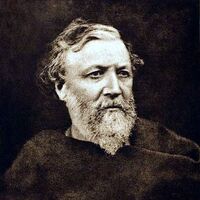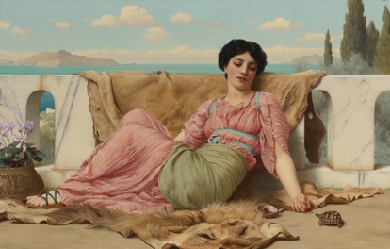Pan and Luna
Si credere dignum est.—Virgil, Georgics, III, 390
Oh, worthy of belief I hold it was,
Virgil, your legend in those strange three lines!
No question, that adventure came to pass
One black night in Arcadia: yes, the pines,
Mountains and valleys mingling made one mass
Of black with void black heaven: the earth’s confines,
The sky’s embrace,—below, above, around,
All hardened into black without a bound.
Fill up a swart stone chalice to the brim
With fresh-squeezed yet fast-thickening poppy-juice:
See how the sluggish jelly, late a-swim,
Turns marble to the touch of who would loose
The solid smooth, grown jet from rim to rim,
By turning round the bowl! So night can fuse
Earth with her all-comprising sky. No less,
Light, the least spark, shows air and emptiness.
And thus it proved when—diving into space,
Stript of all vapor, from each web of mist,
Utterly film-free—entered on her race
The naked Moon, full-orbed antagonist
Of night and dark, night’s dowry: peak to base,
Upstarted mountains, and each valley, kissed
To sudden life, lay silver-bright: in air
Flew she revealed, Maid-Moon with limbs all bare.
Still as she fled, each depth,—where refuge seemed—
Opening a lone pale chamber, left distinct
Those limbs: mid still-retreating blue, she teemed
Herself with whiteness,—virginal, uncinct
By any halo save what finely gleamed
To outline not disguise her: heavenwas linked
In one accord with earth to quaff the joy,
Drain beauty to the dregs without alloy.
Whereof she grew aware. What help? When, lo,
A succorable cloud with sleep lay dense:
Some pinetree-top had caught it sailing slow,
And tethered for a prize: in evidence
Captive lay fleece on fleece of piled-up snow
Drowsily patient: flake-heaped how or whence,
The structure of that succorable cloud,
What matter? Shamed she plunged into its shroud.
Orbed—so the woman-figure poets call
Because of rounds on rounds—that apple-shaped
Head which its hair binds close into a ball
Each side the curving ears—that pure undraped
Pout of the sister paps—that . . . once for all,
Say—her consummate circle thus escaped
With its innumerous circlets, sank absorbed,
Safe in the cloud—O naked Moon full-orbed!
But what means this? The downy swathes combine,
Conglobe, the smothery coy-caressing stuff
Curdles about her! Vain each twist and twine
Those lithe limbs try, encroached on by a fluff
Fitting as close as fits the dented spine
Its flexible ivory outside-flesh: enough!
The plumy drifts contract, condense, constringe,
Till she is swallowed by the feathery springe.
As when a pearl slips lost in the thin foam
Churned on a sea-shore, and, o’er-frothed, conceits
Herself safe-housed in Amphitrite’s dome,—
If, through the bladdery wave-worked yeast, she meets
What most she loathes and leaps from,—elf from gnome
No gladlier,—finds that safest of retreats
Bubble about a treacherous hand wide ope
To grasp her—(divers who pick pearls so grope)—
So lay this Maid-Moon clasped around and caught
By rough red Pan, the god of all that tract:
He it was schemed the snare thus subtly wrought
With simulated earth-breath,—wool-tufts packed
Into a billowy wrappage. Sheep far-sought
For spotless shearings yield such: take the fact
As learned Virgil gives it,—how the breed
Whitens itself forever: yes, indeed!
If one forefather ram, though pure as chalk
From tinge on fleece, should still display a tongue
Black 'neath the beast’s moist palate, prompt men balk
The propagating plague: he gets no young:
They rather slay him,—sell his hide to calk
Ships with, first steeped with pitch,—nor hands are wrung
In sorrow for his fate: protected thus,
The purity we loved is gained for us. So did girl-Moon, by just her attribute
Of unmatched modesty betrayed, lie trapped,
Bruised to the breast of Pan, half god half brute,
Raked by his bristly boar-sward while he lapped
—Never say, kissed her! that were to pollute
Love’s language—which moreover proves unapt
To tell how she recoiled—as who finds thorns
Where she sought flowers—when, feeling, she touched—horns!
Then—does the legend say?—first moon-eclipse
Happened, first swooning-fit which puzzled sore
The early sages? Is that why she dips
Into the dark, a minute and no more,
Only so long as serves her while she rips
The cloud’s womb through and, faultless as before,
Pursues her way? No lesson for a maid
Left she, a maid herself thus trapped, betrayed?
Ha, Virgil? Tell the rest, you! “To the deep
Of his domain the wildwood, Pan forthwith
Called her, and so she followed”—in her sleep,
Surely?—"by no means spurning him." The myth
Explain who may! Let all else go, I keep
—As of a ruin just a monolith—
Thus much, one verse of five words, each a boon:
Arcadia, night, a cloud, Pan, and the moon.



